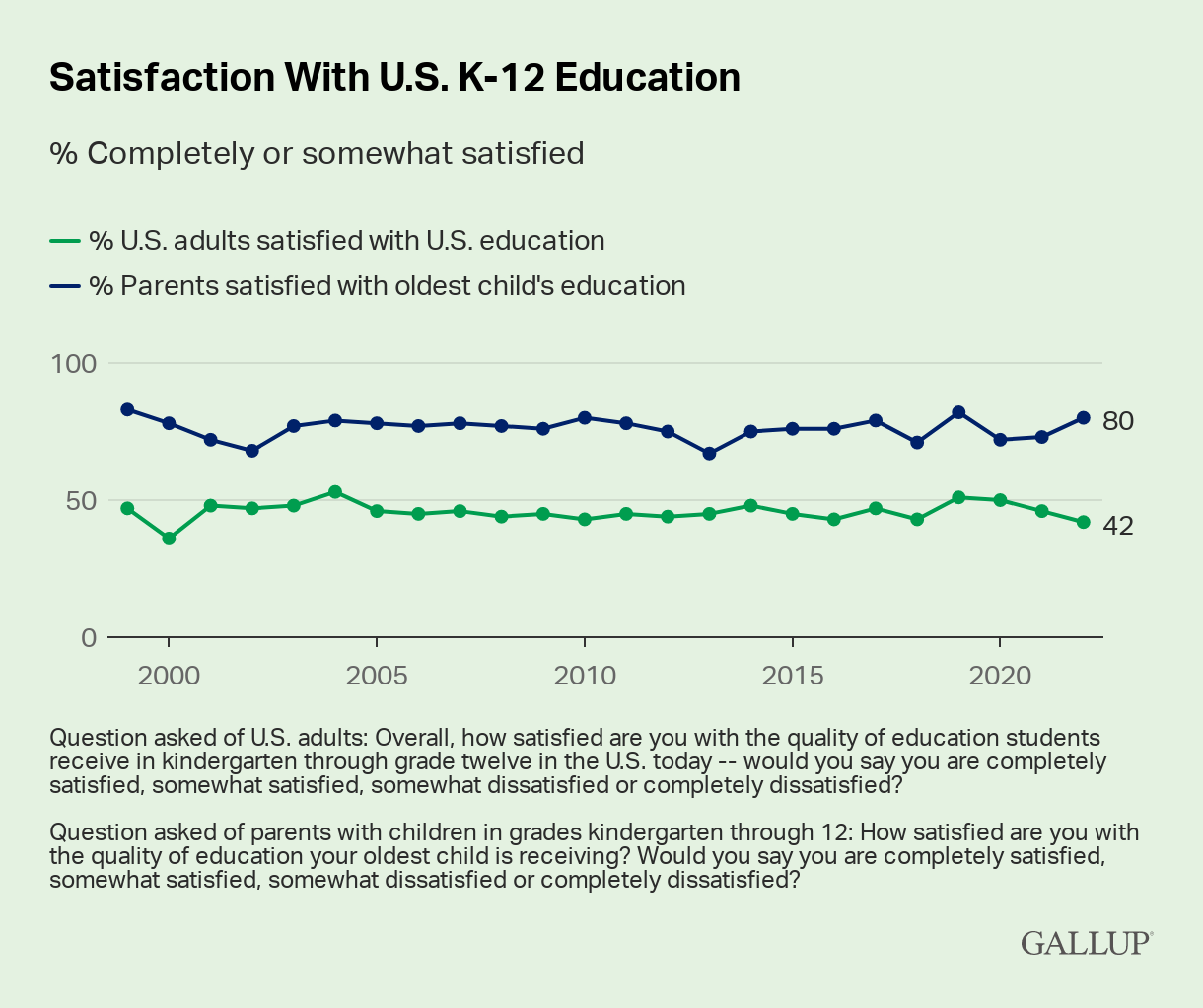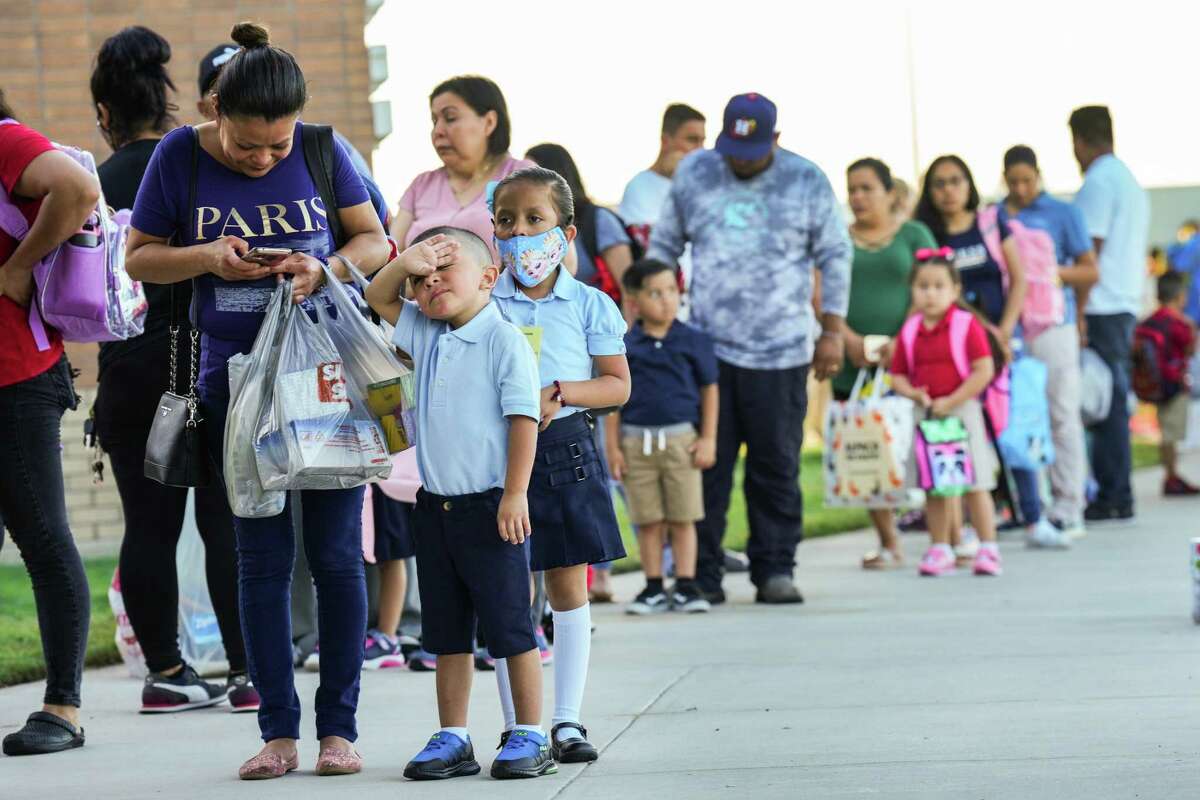For a long time — since 1999 — Gallup polling has been asking parents and the American public in general whether they are satisfied with their oldest child’s education. Given the divisive and tumultuous state of education in the last 3 years, you might assume that parents are extremely unhappy with the schools and districts educating their children. Gallup’s research, however, shows this is not the case.

According to Gallup, parents — those with direct experience with teachers and schools — are actually highly satisfied with the quality of their child’s education. In 2022, 80% reported being satisfied. January of 2019 was a high point for satisfaction — 82% — but even in the thick of the pandemic (2021) the percentage of satisfied parents wasn’t dramatically different than in January of 2020, immediately before the first lockdown. Both were in the 72-73% range.
The data show that all the dissatisfaction that has been seized upon by the media is from the American public at large. This group would include, presumably, many who don’t have children or who have no direct experience with education other than their own time as a student. Only 42% of this group said they were satisfied with American education — a substantially lower number than what parents reported. What I find really interesting is that this difference is fairly stable, going all the way back to 1999. The gap ranges from around 21 points to as high as 42 points, but nowhere does public satisfaction approach or exceed parental satisfaction with education. Weirdly, Gallup reported it like this:
“The 42% who say they are satisfied today is the lowest measured in the past two decades by one percentage point and the second-lowest reading in Gallup’s 23-year trend.”
While strictly true — the lowest American satisfaction was 36% in 2000 — 42% is very much in the ballpark of other years, which often hover in the mid-low 40s. It just feels a tad inflammatory to report it so dramatically.
Then they went on to report parental satisfaction like this:
“At the same time, parents of children attending kindergarten through grade 12 remain largely content with their oldest child’s education. The 80% who are completely or somewhat satisfied is slightly improved from the 73% measured a year ago and exceeds the average of 76% that Gallup has recorded since 2001.”
I’m not sure what their metric is exactly, but 80% is not a “slight” improvement over 73% — it’s a substantial improvement of 7 percentage points; it’s even a substantial improvement over the average of 76%. Why is it being framed as a minimal achievement? And why, in a year of pitched battles across the educational landscape, is a high degree of parental satisfaction given such short shrift?*

image via Houston Chronicle
So what we have here is hard data being framed in a way that curates response. It starts with the bad news, phrases it as even worse news, and then undervalues and undercuts the good news. What I see when I look at the polling data is that more than three quarters of all parents are generally satisfied with American education; that there is a long-standing negative gap between parents and the public as a whole; and that the dissatisfaction lies with the general public who may or may not have recent, direct experience with education. That makes me wonder a few things:
- What’s the source of the gap? Dissatisfaction is a broad term — what, specifically, are their issues? Is it school funding? Curriculum? State standards? Just schools in general? Teachers? Bond issues? Or is it just generalized outrage fueled by clickbait media?
- If parental satisfaction is actually quite high, what does that say about the heavy and frequent rotation of stories in the media focusing on division and dissatisfaction? Does it mean all of that dissatisfaction is a tempest in a teapot?** Or is there possibly something deeper at play?***
- What’s the demographic profile of the dissatisfied general public surveyed? What are their ages, races, educational attainment, gender, etc? Are they parents? Does satisfaction change according to a particular demographic? In other words, is one particular group really unhappy? If so, why?****
In case you’re wondering if the Gallup poll was an outlier, it wasn’t. A Pew survey in 2022 found that over 90% of parents were at least somewhat satisfied with the quality of their child’s education. A New York Times poll found that 77% were satisfied. Focusing just on parents with children in district schools, Education Next reported that 85% were at least somewhat satisfied; more recently EdChoice found that 84% were at least somewhat satisfied.
That’s a lot of satisfaction.
Gallup is supposed to be neutral source of data but the way they’ve framed the discussion is anything but. Probably a good reminder for all of us to confirm findings by seeking out multiple sources instead of listening to a single version of events.
___________________________________________________
*New York Times Magazine similarly reported this as “a 20-year low.” Frustrating, since the poll from their parent publication showed high parental satisfaction with schools.
**Yes, because “Parents are Pretty Happy with Education” isn’t a compelling story.
***Data like this, especially the general public’s dissatisfaction, have been used to justify a lot of proposed and actual policy changes. Multiple states have passed new curriculum restrictions and expansive school choice programs under the banner of advancing parents’ rights. Of course, polling satisfaction data can’t tell us how parents view these various policies, but it does indicate that these changes are not a response to widespread unhappiness with public schools among parents whose children are actually attending those schools.
****A recent EdChoice survey found that among non-parents, only 29% said the local schools were on a positive trajectory, compared to 57% of parents. A satisfaction gap between parents and non-parents has also shown up the Education Next and New York Times polls. Again, though, no demographics on the dissatisfied non-parents.
